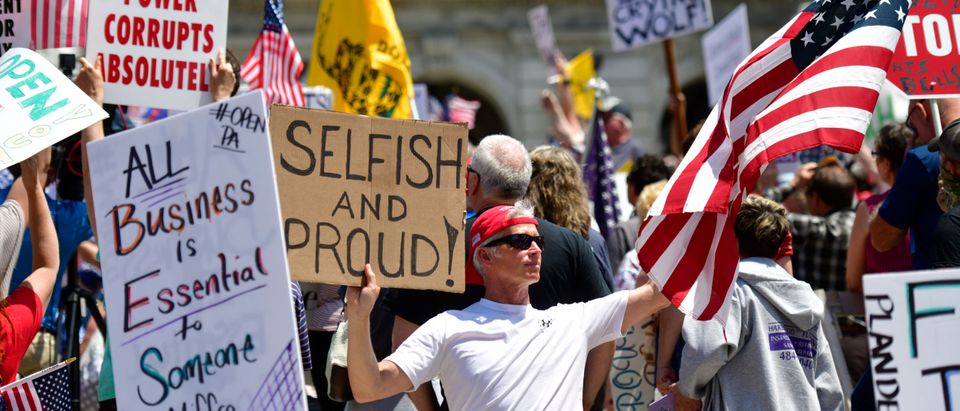Pennsylvania voters approved two ballot measures Tuesday to limit the governor’s emergency powers and give more power back to the state legislature.
While the final vote tally is still incomplete, preliminary results show 54% of voters supported a ballot question that would allow a simple majority of lawmakers to do away with a disaster declaration at any time, according to The Philadelphia Inquirer. As of current, the governor or two-thirds of the assembly can terminate the declaration, according to the report.
Another measure passed by a similar percentage of voters limits the length of a disaster declaration to 21 days rather than 90 days and gives the legislature the power to extend an emergency order rather than the governor, according to the report.
BREAKING: (AP) Pennsylvania voters become the first in the nation to impose restrictions on a governor’s authority under an emergency disaster declaration.
— Stephen Ohlemacher (@stephenatap) May 19, 2021
The measure passed mainly along party lines, with the proposals supported mainly by Republicans, according to KYW.
Republican State Sen. Scott Martin who helped author the amendments applauded voters for voting yes in a statement obtained by the Daily Caller.
“The people of Pennsylvania have spoken. Adopting these two constitutional amendments begins the process of restoring checks and balances to the decision-process of how we as a state deal with long-term emergencies.”
“Residents of this Commonwealth knew that a yes vote meant a return to communication, collaboration and transparency in the handling of future emergencies,” he continued. “We now will begin the steps to adopt a better way to handle emergencies that involves accountability and working together across all branches and levels of government.”
Chairman of the Pennsylvania House State Government Committee Rep. Seth Grove said the state “Constitution has been permanently changed to reestablish our constitutional checks and balances.”
Pennsylvania was the first state to have ballot questions to curb executive powers during emergency declarations.
Our constitution has been permanently changed to reestablish our constitutional checks and balances.https://t.co/VrIZoqLCmA
— Rep. Seth Grove (@RepGrove) May 19, 2021
President and CEO of the Commonwealth Foundation think tank Charles Mitchell congratulated voters who “defended some of our most important founding principles” in a statement obtained by the Daily Caller.
“Fourteen months ago, governors across the country took unprecedented actions in their attempts to mitigate the effects of the COVID0-19 pandemic,” Mitchell said. “Using the powers vested in them via the states’ respective emergency powers laws, many shut down businesses, schools, sporting events, even playgrounds and churches.”
“While some took care to respect the civil rights of their citizens to the maximum extent possible, others saw their emergency powers laws as a vehicle for them to act in contradiction to their own state constitutions and the U.S. Constitution for as long as they’d like.”
“Our state and federal governments must find ways to simultaneously protect the lives and livelihoods of the people while not violating our rights as free citizens,” he continued.
Democratic Gov. Tom Wolf recently called on voters to vote ‘no’ to the ballot proposals, saying they were “politicizing disaster response,” according to WTAE.
The head of the state’s Emergency Management Agency said the measures could have a “detrimental impact on the state’s ability to respond to future disasters and emergencies,” according to NBC Philadelphia.
Republican Majority Leader Kim Ward of Pennsylvania’s Senate said in April that voting “yes” gives power back to the people, according to The Philadelphia Inquirer.
“A ‘yes’ vote does not take power away from the governor,” she reportedly said. “Rather, it brings back the balance of power by giving the people a say in how to manage their communities during emergency situations.”
Senate GOP Caucus spokeswoman Erica Clayton Wright said in April “an emergency declaration is meant to give the executive branch the power to triage a crisis, not a vehicle for the governor to enact, amend and suspend laws and regulations for an excessive period of time,” according to NBC Philadelphia.
Wolf and Republicans have been locked in a battle since the beginning of the pandemic, with Wolf imposing a series of lockdowns and closures that have been criticized by Republicans.
The fight has been taken to court; the Third U.S. Circuit Court of Appeals ruled in October Wolf could reinstate his restrictions after a federal judge ruled his orders were unconstitutional.
U.S. District Judge William Stickman IV ruled in favor of plaintiffs who alleged the governor and Secretary of Health Rachel Levine imposed arbitrary restrictions and violated constitutional rights.(RELATED: Pennsylvania Health Secretary Made Secret Agreement To Allow Car Show Against State’s Gathering Limit)
Stickman ruled while Wolf’s actions “were undertaken with the good intention of addressing a public health emergency … even in an emergency, the authority of government is not unfettered.”
Stickman ruled the state’s gathering limits violated the right of assembly and that the stay-at-home and business closures violated the Fourteenth Amendment.


